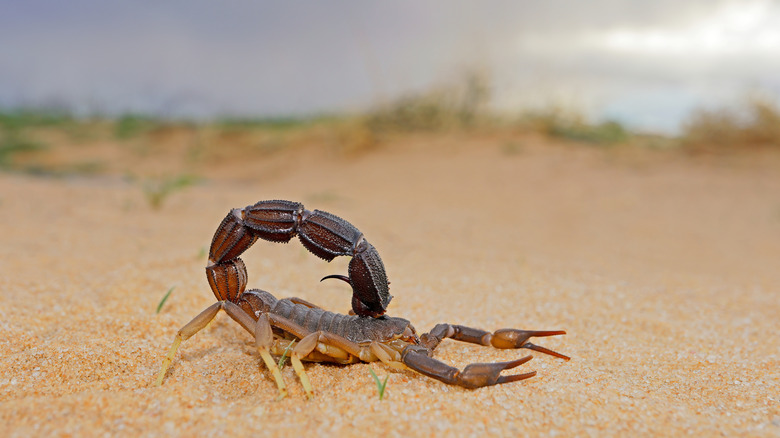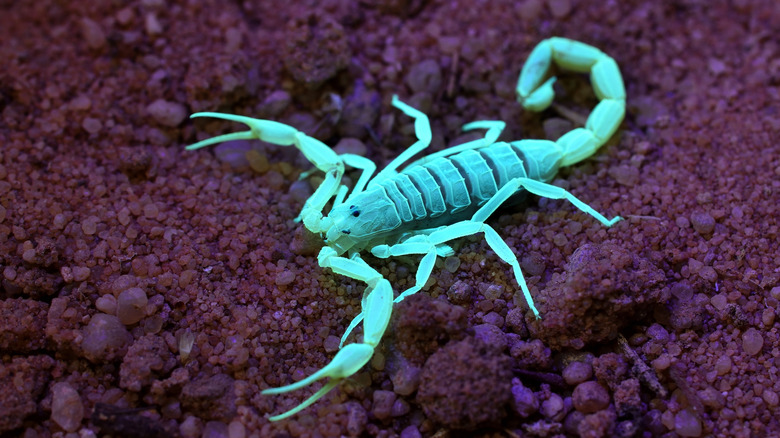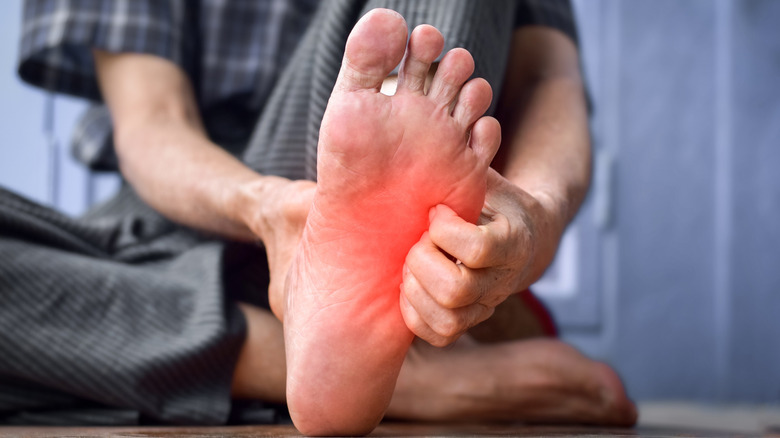One Useful Piece Of Camping Gear Can Help You Find Scorpions Hiding In Your Campsite
We may receive a commission on purchases made from links.
People head out to nature to escape the stresses and worries of everyday life. As seen in the tranquil camping trend, an overnight stay in the great outdoors can do much to relax and soothe you. However, there are also inconveniences that come with it. It's not always easy to snooze well outside of the comfort of your regular bed — though here are simple tips for sleeping comfortably while camping – and you may encounter other annoyances and even dangers. These include changes in weather, swarms of mosquitoes, wildlife, and creepy crawlies that can deliver nasty bites or stings. One such creature found in many regions of the U.S. is the scorpion.
While they certainly look formidable, these critters are generally harmless and shy. Scorpions like to hide out, which can make them difficult to detect. While there are methods to avoid an unwelcome encounter with these venomous arachnids — shaking out your shoes and keeping the tent firmly zipped up come to mind — you can also equip yourself with a weapon that will help you easily detect any who happen to make your campsite their home: a black light.
An essential tool for detecting scorpions in your campsite
Black lights are special lamps that emit a kind of ultraviolet radiation known as UVA. While once commonly used for entertainment purposes such as haunted houses, raves, and lighting up flourescent posters in teenagers' bedrooms, they also make a great tool for detecting scorpions.
Due to a substance in their exoskeletons known as the hyaline layer, scorpions glow bright green when hit with ultraviolet light. While the jury's still out as to exactly why this happens, researchers have found that the outer layer of a scorpion's exoskeleton contains chemicals which light up when they come in contact with UV rays. Some scientists hypothesize that this may be a way for scorpions to avoid direct sunlight or confuse their prey. Whatever the reason, it makes them easy to spot once the sun goes down — as long as you have the right equipment.
To look for scorpions, just get a UV flashlight (like the uvBeast Mini Black Light) and scan the area in and around your campsite. Any scorpion out in the open will clearly glow up to 10 feet away, allowing you to serve it with an eviction notice. While some elect to kill scorpions, non-lethal methods include coaxing or scooping them into a container and releasing them far from the campsite. Just make sure to wear long sleeves and gloves when dealing with a scorpion, as a sting can be painful, and on rare occasions, dangerous.
Other methods for dealing with scorpions
One reason searching for scorpions with a UV light is so effective is because they're most active at night. During the day, scorpions hide out under rocks, logs, or anywhere else they can escape the glare of direct sunlight (and the eyes of predators). After dark they come out to hunt and mate, making it the most likely time for encounters with humans.
If you ever get stung by a scorpion, don't panic, as most scorpion stings only cause mild reactions (redness, a bit of swelling, and pain around the sting). Make sure to clean the affected area with soap and water and apply pressure with a cold pack or ice. If the sting is on your arm or leg, elevate the affected limb, and take an over-the-counter pain reliever such as ibuprofen if one is available. If you are having any major symptoms — such as numbness, irregular heartbeat, or difficulty swallowing — seek immediate medical attention.
There are also other measures you can take to decrease the likelihood of unwanted scorpion encounters when camping. Make sure your tent is properly sealed — zipped up tightly with no holes or gaps in the seams — and look into using Scorpion Glue Traps near the tent's entrance or windows. Some people also rub natural oils like lavender, peppermint, and citronella on areas of the tent where scorpions could enter, as they're repulsed by the smell. You can also use bug-killer (anti-tick sprays work well) to dispatch any scorpions you come across, and try to set up your camp away from sandy areas with a lot of rocks, as this tends to be prime scorpion habitat. For optimal comfort in the great outdoors, check out these easy hacks that transform your basic campsite into a luxurious glamping experience.


